Text
“Invincible”, Season 1 (2021) Review

Somehow both very cool and very fucking stupid :D
About
Created and written primarily by Robert Kirkman (principle writer for The Walking Dead comic and TV show), this Young Adult cartoon basically synthesizes a number of comic book characters (e.g., Superman, Batman, Green Lantern, Hellboy, Wonder Woman, Gambit) and tries to balance their heroism with cynical twists and dark realities. It's an exercise like Brightburn (2019) in that it mirrors existing comic writing all too closely in order to make violent twists. The cool stuff arrives pretty much immediately. You can tell right away that the physics have some level of realism, and it quickly gets serious because of this. The easy comparison would be to The Boys (also by Amazon, also about violent heroes, and also very well-produced). So, if you like The Boys (2019–), you'll probably like Invincible only a little less.
(( Some spoilers but nothing too specific ))
Wrong Focus
But, the stupid stuff comes from the same error that the Kick-Ass movie (2010) made: it focuses on the wrong person(s). In Kick-Ass, the error was focusing on.. well.. "Kick-Ass", an irredeemable loser and waste of screen time. Invincible makes the same mistake, focusing on.. well.. "Invincible", a (so far) irredeemable loser and waste of screen time. So, despite its virtues, this show cannot escape that it made the decision to go for the Young Adult viewing demographic. It reminds me of Alita: Battle Angel (2019) in that way too: some very cool adult concepts ruined by the dramatic devices of unrepentant teenage stupidity and irrelevance. I didn't even like that stuff when I was a teenager, though Jordan Catalano gets a pass.
Main Cast and Characters
The supporting characters were also very stupid. The most annoying was definitely Amber Bennett (voiced by the otherwise cool Zazie Beetz from Deadpool 2 (2018) and Joker (2019)),

who is supposed to be attractive somehow to Mark Grayson ("Invincible", voiced by Steven Yeun, who played Glenn on The Walking Dead)

despite the fact that she constantly judges him, fails to understand him, often fails to give him any kind of benefit of the doubt, and continues to scowl at him and be hurtful towards him even when she has information that should change her outlook towards him. And because she is part of the love triangle shared between herself, Invincible/Mark, and "Atom Eve"/Samantha (voiced by the awesome Gillian Jacobs from Community (2009–2014)),

audiences simply have to bear with it that Amber's annoying character will be present and wasting time until Mark can realize that Amber is in fact toxic and that Eve actually understands him and can improve him in more positive directions. That love triangle should have been a 20-minute distraction, but I'm guessing that it will eat up a season or two more, especially if the writers become cowardly and fail to change things for fear of messing up a perceived "winning" formula. In my ideal story line, they would skip ahead 10 years, drop the teen drama, the love triangle, and the stupid jokes and have Invincible and Eve paired in defense of Earth, with the main tension being from their worry that the other would be horribly gored in front of them during lethal fights against cosmic enemies ;)
Aside, I am aware of Amber’s motivation for being a bad person, I just think her justification is not based in understanding, empathy, and a regard for the gravity of Invincible’s situation. In a strict political sense, Invincible should not commit a lie of omission by keeping her in the dark about his identity — even if for the “noble lie” reason of protecting her — but in a real sense, he is a fucking teenager who just developed his super powers. For her to pretend that he should reveal his entire identity to her — a potentially transformative and even dangerous decision — after a few months of teenage romance paints an absurd portrait of her mind. It does, however, align her with Omni-Man, because where Omni-Man forces Invincible to become an adult in the fighting sense (pushing with full force early on), Amber forces Invincible to become an emotional adult by getting him to understand that toxic people such as herself need to be given boundaries — and he needs to learn to clearly delineate and communicate his real desires. By knowing that he does not want Amber, people who regiment his free time, or people who do not suit him, for instance, he can realize why Eve was an obvious decision: Eve understands, can make time when they have time, and will let him find his decisions. Part of a coming-of-age story tends to be realizing what one actually wants, and Invincible’s hesitation in telling Amber his identity shows that he does not truly want her. This separates Invincible from, say, Spider-Man, who avoided telling Mary Jane his identity not because he did not want her but because he wanted at all costs to protect her.
The next most annoying character has to be Debbie Grayson (voiced by TV-cancer Sandra Oh and who luckily was not animated to look like the real Sandra Oh and who should have been voiced instead by Bobby Lee due to Lee's successful MadTV parody of Sandra Oh).

Debbie basically fills the role of Skyler in Breaking Bad, except that Debbie's character tends to be slightly more understanding before her inevitable and toxic Skyler-resentment and undermining behavior. Despite having an 8-episode arc of change, Debbie's character flips too quickly and lacks the empathy and Omni-Man motive-justifying that would make her interesting (the comic's development may vary). For instance, if she refused to believe that Omni-Man meant his own words, that would make her empathetic and perhaps virtuous even if misled, but instead she dropped their "20 years" of understanding after viewing Omni-Man in action, which makes her appear shallow, easily manipulated, and unsympathetic. That was a definite "Young Adult" genre move because it shows immaturity by the writers to break apart a bond of 20 years so quickly. Mediocre teens might accept such a fissure because their lives have not yet seen or may not comprehend that level of time, but adults know that even long-standing and problematic relationships (which, beyond the lie, Omni-Man's and Debbie's was not shown to be) take a lot of time to break — even with lies exposed.
Omni-Man
The biggest show strength for me was of course Omni-Man, who in a success of casting was voiced by J.K. Simmons in a kind of reprisal of Simmons' role as Fletcher from Whiplash (2014).
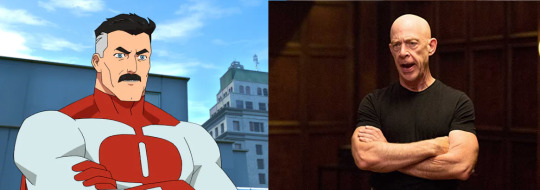
The Fletcher/Omni-Man parallel shows through their being incredibly harsh but extremely disciplined and principled, forcing people to become beyond even their own ideal selves (this via Omni-Man's tough-love teaching of Invincible — comically, Omni-Man was actually psychologically easier on Invincible than Fletcher was on Whiplash's Andrew character). Despite the show's attempts to villainize Omni-Man, he, like Fletcher and also like Breaking Bad's Walter White, becomes progressively more awesome, eventually representing a Spartan will, an unconquerable drive, and a realistic and martial understanding of a hero's role.
To the show's credit, while it wrote Omni-Man to be outright genocidal and from a culture of eugenicists (again, Spartan), they could not help but admire him and his "violence" and "naked force" (for a Starship Troopers reference), giving him a path to redemption. That redemption comes in part because — despite the show's attempt to be often realistic and violent — its decision to be directed at young adults via dumb jokes, petty relationship drama, the characters’ reckless lack of anonymity and security in their neighborhood (loudly taking off and landing right at the doorstep), and light indy music also made the portrayed violence far less literal. With a less literal violence, the real statement becomes not that Omni-Man really did kill so many people (though he certainly did kill those people within the show's plot) but that he was symbolically capable of terrible violence but could be reformed for good. That's the shortcoming with putting violence under demographic limitations. If it's a PG-13 Godzilla knocking down cities, the deaths in the many fallen skyscrapers don't matter so much (the audience will even forgive Godzilla for mass death if it happens mostly in removed spectacle), whereas if it's Cormac McCarthy envisioning a very realistic fiction, every death rides the edge of true trauma.
By showing light between the real and the symbolic, it is much easier to identify and agree with Omni-Man. For instance, when Robot (voiced by Zachary Quinto of Heroes and the newer Star Trek movies)
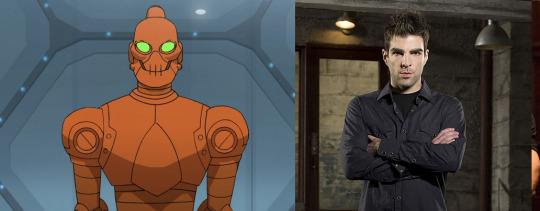
shows too much empathy for the revealed weakness of "Monster Girl" (voiced by Grey Griffin), the audience may have thought, "Pathetic," even before Omni-Man himself said it. And this because Omni-Man knows that true and powerful enemies (including himself) will not hesitate to use ultra-violence against these avenues of weakness. "Invincible" can make his Spider-Man quips while in lethal battles, but he does so while riding the edge of death — something that Omni-Man has to teach Invincible by riding him to the brink of his own.
Other Cast/Characters and Amazon's Hidden Budget
It was impressive how many big-name actors were thrown into this — a true hemorrhage of producer funding. Amazon has so far hidden the budget numbers, perhaps because they don't want people to know that the show (like many of its shows) represents a kind of loss-leader to jump-start its entertainment brand.
Aside from those already mentioned, the show borrows a number of actors from The Walking Dead (WD), including..
• Chad L. Coleman ("Martian Man"; "Tyreese" on WD),

• Khary Payton ("Black Samson"; "Ezekiel" on WD),

• Ross Marquand (several characters; "Aaron" on WD)

• Lauren Cohan ("War Woman"; "Maggie" on WD)
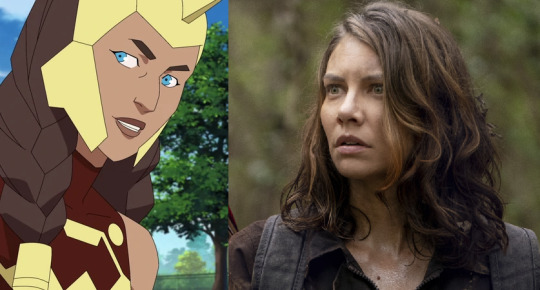
• Michael Cudlitz ("Red Rush"; "Abraham" on WD)
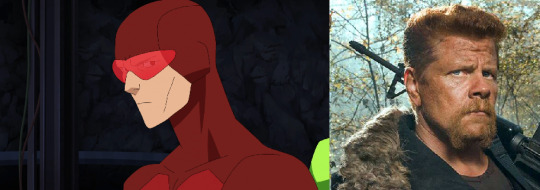
• Lennie James ("Darkwing"; "Morgan" on WD)
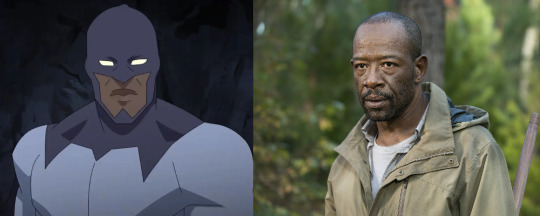
• Sonequa Martin-Green ("Green Ghost"; "Sasha" on WD)

There were also connections to Rick and Morty and Community, not just with Gillian Jacobs but also with...
• Justin Roiland ("Doug Cheston"), who voices both Rick and Morty in Rick and Morty,

• Jason Mantzoukas ("Rex"),

• Walton Goggins ("Cecil"),
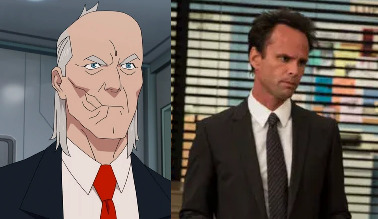
• Chris Diamantopoulos (several characters),

• Clancy Brown ("Damien Darkblood"),
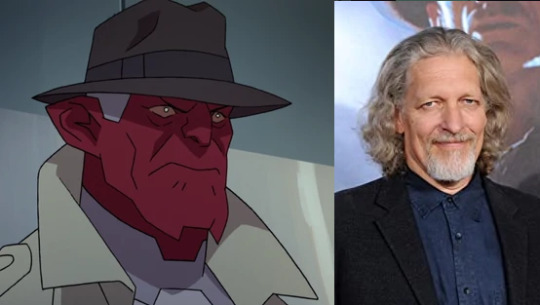
• Kevin Michael Richardson ("Mauler Twins"), and

• Ryan Ridley (writing)
That's a lot of overlap.
They even had Michael Dorn from Star Trek: TNG (1987–1994) (there he played Worf) and Reginald VelJohnson from Family Matters (1989–1998) and Die Hard (1988), and even Mark Hamill. Pretty much everyone in the voice cast was significant and known. Maybe Amazon got a discount for COVID since the actors could all do voice-work from home? ;)
Overall
Bad that it was for the Young Adult target demo but good for the infrequent adult themes and ultra-violence. Very high production value and a good watch for those who like dark superhero stories. I have heard that the comic gets progressively darker, which fits for Robert Kirkman, so it will likely be worth keeping up with this show.
23 notes
·
View notes
Text
“Wild Mountain Thyme” (2020) Movie Review
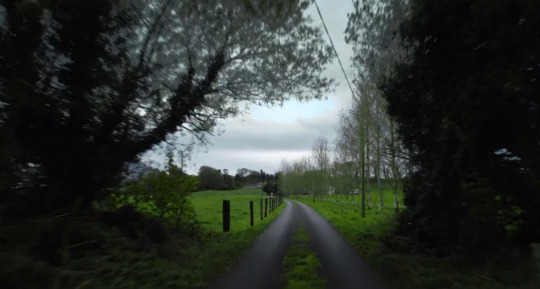
This was a beautiful one :)
The script moves very quickly with a lot of meaningful dialogue that doesn't really get center stage in the direction (like, for example, a character will say something poetic that you can easily miss if you're not paying attention; like, "I'm half-dying with living for you"), so it may get better with multiple viewings or better with the subtitles on. I suspect that this understating of dialogue was part of why this movie isn't doing well right now (current Rotten Tomatoes: 27% critics / 44% audience); people may just not have heard what the actors were saying.
Another factor may be that this movie rejects the cynicism that's become mandatory in America cinema. The central character, Rosemary (Emily Blunt), actually believes in love, which has become something rejected by the American (pseudo?)-intellectual class. This puts her character in contrast to NYC American Adam (Jon Hamm), who considers marriage in terms of beneficial contracts. Adam is, nevertheless, enchanted with the romanticism of Ireland, being drawn to Rosemary and to farming even though he has no rational reason to pursue business in Ireland (a "blood from a stone" situation). So it's both a matter of city versus country and of its underlying rationalism versus romanticism — a good bounding for a story, particularly in times when overzealous declarations of most "rational" practices can reduce one to imagination-stifling thoughts.
(( Spoilers ))
This overly self-absorbed thought pattern emerges through Anthony (Jamie Dornan), who, like Dostoevsky's "Notes from Underground" character, finds himself all too concerned with what is correct or whether or not he is right to even want the things that he wants. This is summed nicely in one particular exchange between Rosemary and Anthony:
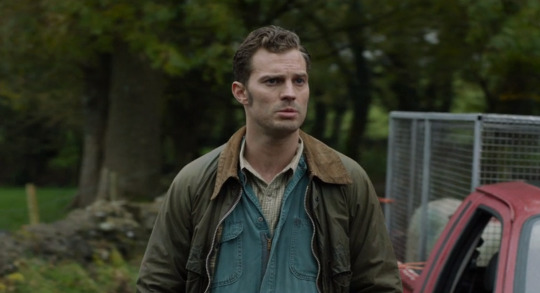
[Anthony]: (Speaking of manual labor that Rosemary has been doing alone) "It's a two-man job."
[Rosemary]: "Or one woman."
[Anthony]: "Yup, that's the world now. Men are useless."
[Rosemary]: "It's not so."
[Anthony]: "What?"
[Rosemary]: "Men aren't useless."
[Anthony]: "What's a man for now? What's his place?"
[Rosemary]: "That's for you to say."
[Anthony]: "I'm not talking; maybe the quiet around the thing is as important as the thing itself."
This exchange points out the difficult position men (and people in general) have been put in by today's social conventions. Perhaps some would like to think that adherence to social convention ended in Jane Austen's time, yet here Anthony finds himself threading a needle. All the roads have been closed behind him, and he feels like he has no voice. People cannot even talk about the things that ail them, because pitfalls emerge at every step. Like the crows above them, no amount of answering to the mob will produce clarity of action. But Rosemary tries to guide him:
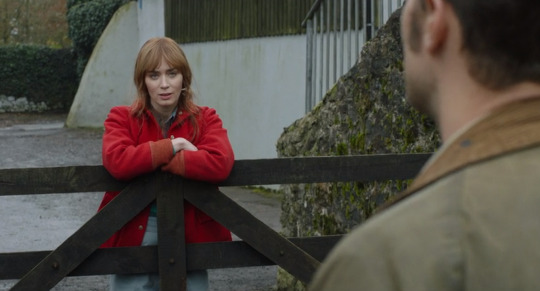
[Rosemary]: "Do you still hear the voice in the fields?"
[Anthony]: "I dunno."
[Rosemary]: "It's not a modern idea."
[Anthony]: "I'm not a modern man."
[Rosemary]: "You have the farm."
[Anthony]: "I do?"
[Rosemary]: "Are you happy?"
[Anthony]: "No."
[Rosemary]: "Why not go ahead, be happy?"
[Anthony]: "I— I don't know how."
[Rosemary]: "There is no one left to catch you laughing, Anthony."
[Anthony]: "True."
[Rosemary]: "How many days do we have while the sun shines?"
[Anthony]: (Looking at the weather) "It's not shining."
[Rosemary]: (Looking at Anthony) "I believe that it is."
The "voice in the fields" speaks of Anthony's romantic desire for freedom, and it is revealed near the end that the voice tells him not just, "Go," but, "Go to her." Meaning, Anthony knows that he loves Rosemary and wants to be with her despite the obstacles that others and he himself construct, but, like the fence was revealed to be in this particular scene, his "Notes from Underground" social conscience is the great barrier between himself and Rosemary. And he wants to be able to love her *not* because a marriage would be useful or to otherwise manage the practical considerations of a farm — he is instead *waiting* to clear his conscience of these worldly affairs so that he can look directly at her. Essentially, like many people trapped in Hamlet inaction, he is waiting to be forgotten and to die.
It later takes a concerted effort by Rosemary to break Anthony from this mental trap. Comedies have all the time in the world, but the timeline has to be compressed into tragic logic because Adam will be arriving to propose marriage. Rosemary hints that she cannot wait for Anthony forever. They've arrived at a Thanatos / Eros crossroads where Rosemary can either kill herself with a hidden shotgun (albeit not immediately), due to the burdens of isolation, or end up like Fiona — pulled away from Anthony by the world and another marriage opportunity. Rosemary has Anthony's ring, so she knows that he wants to marry her, so she wants to help him work through his conscience to find her. The metaphoric "fences" will remain, but it's not hopeless:
[Rosemary]: "We say what's meant. Life is here. We name it."
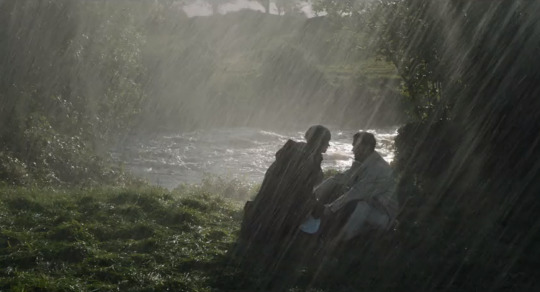
Like I mentioned with the cynicism above, American culture has attempted to crush this level of devotion. The very idea that someone could love someone this much for so long has been treated with general critical derision. But the story alleviates this perspective through Anthony's own incredulity, Emily Blunt's performance, and a charming Irish backdrop.
Even so, the movie has its issues. A lot of the scenes were directed like one might direct a theater play rather than a movie. Errors like the actors having to move in overly blocked (positioned) ways or the lines being too melodramatic for the moment occur. Of the blocking issue, one scene in particular was the near-end scene of Anthony and Rosemary in a home together.
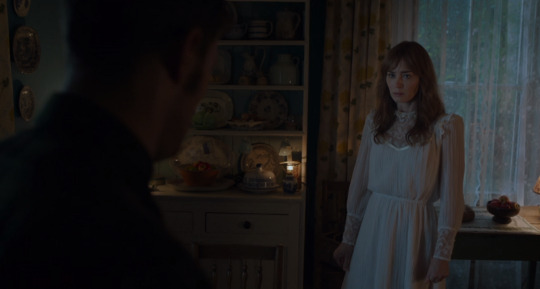
There was a little too much attention on standing and sitting here, with the object awareness being a little too simplistic — the sort of imagery which works on stage but not on film. Like, "[Oh, you sit now while I stand. Then I tell you to sit, and you sit. When you stand, I notice how tall you are.]" These make sense on stages where the script fell together with basic props like a table and chairs, but in a real home they end up feeling artificial. These sorts of scenes should have been re-worked when this story was brought to screenplay.
The background music was also often problematic. In many scenes it was just *too* responsive to the on-screen events, which speaks of low production value. This seems to fall on the musical direction of Amelia Warner, because much of the Irish folk music (which was good) was already incorporated into the script. Those organic moments made sense and worked, like Emily Blunt singing the movie's title song in probably the most emotional scene of the movie.
And casting issues cannot be ignored. This was not exactly a "Waking Ned Devine" (1998) Irish story that recruited mainly unknown or lesser known quirky actors from Ireland and Scotland. Christopher Walken, for instance, should not have been in this movie, though his performance did come together for the pub singing scene. Weirdly, Emily Blunt gave the best performance in this movie, and she's from Britain. Jamie Dornan is Irish, so that made sense, but while viewers could believe Emily Blunt's loving glances in his direction, whenever Blunt and Dornan actually touched each other there seemed to be no chemistry. Those scenes looked more like two actors not sure how real vs. respectful they should be and defaulting on the side of "[make just enough contact to get us to the cut]." This falls to both casting and (again) to direction. A better cast may have had chemistry, and a better director could get the actors to show that chemistry. Personally, I think they should have gone full local and hired only unknown actors and actresses from Ireland. Extra points if even the American character had been played by an Irishman pretending to be American ;D
Still! All said, despite these issues, it has a very strong script. *Reading* the words really shows how much was here. Long though this review may be, it doesn't show just how much material was in this script. And Emily Blunt's performance can't be ignored; it was really her movie. So I'd ignore the current rankings and recommend this for a good romantic movie with clever dialogue and a few moving moments :)
4 notes
·
View notes
Text
“The Dead Don’t Die” (2019) Movie Review
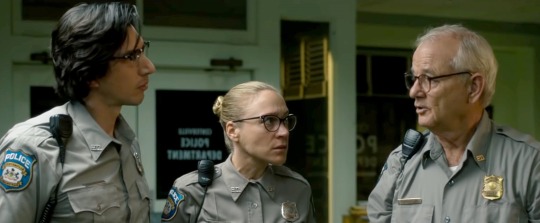
Too derivative?
This was a pretty funny movie (not lol-funny but little chuckle moments every 15 minutes maybe), with a big cast and good production value, but it only goes partially into Pirandello metatheater (not enough to make it really interesting) and just borrows everything else from "Dawn of the Dead" and other classic zombie genre works.
The major zombie borrow for the writing seemed to be from "Dawn of the Dead", particularly the idea that zombies would return to the activities most hard-wired into them while they were alive. That was the mall for "Dawn of the Dead", but here, even more satirically it's cell phones, sports, music, and coffee. Since "Dawn of the Dead" already treated that idea like a joke, it's basically the same joke but with more examples. One highlight of this joke is that they cast Charlotte Kemp Muhl in this movie (If unfamiliar: she's been in/on an absurd amount of high fashion magazines). When they listed her in the opening credits I wondered, "What? Why?" and amusingly she only appears as a zombie near the very ending so that she could strike a pose and deliver one line before being killed: "Fashion!"
This repeated joke was all part of a pretty obvious critique on consumer culture (that "derivative" element of the movie; "zombies" are most traditionally metaphors for the drones of society who go about without self-reflection or worldly awareness — killable in mass because their identities are not particularly distinguishable from any other mass-produced identity).
(( Minor SPOILERS ahead ))
This was at last sermonized upon by the hermit character in the ending scene, with the general idea being that people distract themselves with petty lifestyle attachments while ignoring the general purposelessness of their lives, digging their own graves in the process. The hermit and the alien were the only ones seemingly outside of this, which likely indicates the preferences of the writer-director (Jim Jarmusch, director of "Only Lovers Left Alive") or (more likely) just indicates further fatalistic critique. I.e., either it is virtuous to be a hermit who does not negatively affect the world (just living off of salvaged items and a stolen chicken here and there), and/or it is virtuous to live by a kind of Bushidō clarity where possessions are minimized and the world's drama is optional anyways. Both are satirical, because the hermit lives in filth, and the writer-director isn't exactly poor if he's making mass-released movies; and the katana-wielding alien moves in comically-rigid movements and speaks only in all-too-formal patterns (this was the very early giveaway that she was an alien, even before her final scene confirmed it). At best, an alien life-form paints a picture of virtue by showing a species which survived its extinction events through technology (interstellar travel) and study (such as this alien's study of humans), which means that the writer-director may prize scientists for their work but probably not for their common vices, and, of course, he prizes observation — pretty crucial for a good director to be a good observer.
This prizing may be pushed further by the larger narrative of the story wherein scientists have failed to convince consumers (or just lobbyists and consumer representatives) that "polar fracking" can bring about the apocalypse. It's a point driven in by the rampant nihilism of the movie: this is not an action movie where people have a will to survive and push against all odds to defeat their impending deaths; it's a slow-paced suicide where most of the characters are too befuddled or unimaginative to have contingencies for their next moments much less solve a world-wide environmental issue. Just as Adam Driver's character has "read the script" literally, the consumer-nihilists that these characters reflect have "read the script" figuratively and thus know that mega-corporations are distant powers that can destroy the world through misaction and misinformation while the consumers that empower them will only make futile gestures in the aftermath. They see their deaths and can barely muster the enthusiasm to be affected, "and they blink." So the police go on patrol not even with a plan to kill zombies and lessen the immediate problem but simply because it's the usual routine. Two friends locked in a hardware store can't think to board up both entrances and don't even have the spirit to evade a rush of zombies. Three hipster outsiders know that zombies are moving to the town, but they sit in their hotel room and wait to die.
This isn't (just?) bad writing, it's the use of character clichés to make a point. The movie is heavily-politicized and in not very nuanced terms. It's a left/right binary type of narrative, endorsed by the presence of the always political Chloë Sevigny, and given a semi-villain via a MAGA-parody hat-wearer. Not too surprisingly, this lack of nuance is forced to re-write the MAGA slogan to conform to its bias (reading instead "Keep America White Again", a grammatically dubious rewrite ("Keep" as present and "again" as not present but intent on a future) meant to show the misinformed logic of the wearer, who, also not surprisingly, is a gun nut farmer whose few lines paint him as a racist). If one took away some good faith in writer-director Jarmusch, the repeated phrase "Kill the head" could also be a kind of subliminal assassination message ("Kill the head" has a specific wording which gives multiple meanings via "the head" as a person's bodily head and also as "the leader"). Jarmusch's motives could be salvaged by saying that he mocks the Prius and smart car -driving people also, but this MAGA farmer is given a particular disdain and deliberate effort is made to not help him (Murray passes by his home and says that they'll call him — even though the phones were known to not work) and glee is meant for his death. An NYC/L.A. audience was certainly in mind for this movie.
But, interestingly, this directed hate does not redeem the NYC/L.A. nihilists (represented by Driver, Sevigny, and Murray). Murray and Driver break the fourth wall with Murray asking if Driver is "improvising", with the references to the movie's theme song, and with their talk of the movie's script; but they fail to take action until their deaths are already assured. If Jarmusch is a kind of insurrectionary or post-left anarchist (like his hermit, not "paying in" to corrupt systems — ensuring that his consumer spending does not reach the wrong people and critiquing the failed revolutions of leftism), then his "Kill the head" line was meant as a means of acting against threats to survival. But, if he sees any attempts at action to be like the futile gestures of Driver and Murray, then Jarmusch may be a nihilist himself, lacking the imagination to escape the clichés that he places on his characters. I'd give Jarmusch credit here and say that he's appealing to his nihilistic viewers while making fun of them, but he is harsh on his characters because he himself lacks the ability or will to act.
So anyways, worth a watch. Not worth theater admission, but fine for home viewing.
0 notes
Text
“Dark Phoenix” (2019) Movie Review
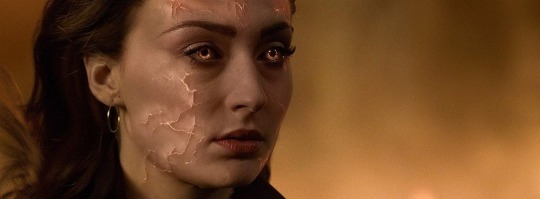
Fairly entertaining :p
I don't like the Marvel Cinematic Universe (MCU) movies (Avengers and related characters), but the X-Men Marvel movies have continued to be decent. "Days of Future Past" (2014) was probably the last *good* one (I rewatched "Logan" last month and am still annoyed with about 60% of it), but "Apocalypse" (2016) showed glimmers of good content, and that continued with Dark Phoenix.
This one departs from the "X-Men: The Last Stand" Dark Phoenix character by using the D'Bari/alien story instead; Jean inherits her powers from a solar flare which turns out to be the "Phoenix Force", and the D'Bari pursue her. This made it a bit closer to the X-Men:TAS story, but without Wolverine present (doubtful to be recast at all in this franchise?) or the Inner Circle / Hellfire Club being introduced, it's not really worth more comparison — this was still a fairly unique version of the story. (( Minor Spoiler )) The ending does leave the Inner Circle as a logical next step, but I thought resurrecting Apocalypse for his captured psychics thing was a logical next step. This franchise doesn't seem to have the legs for that level of continuity. Magneto still doesn't even know that Quicksilver is his son, and I don't even think they wrote a "knowing glance" for Quicksilver into their joined scenes. (( End Spoiler ))
I still don't like their choice of Cyclops (Tye Sheridan), and I think that that becomes an issue when Sophie Turner is supposed to have chemistry with Sheridan as an anchor to Phoenix struggling to regain her Jean Grey side. No chemistry meant you really had to imagine him as a different actor for their scenes to work ;p ... Tye Sheridan kind of reminds me of how in Terminator 2 they showed a cool-looking future John Connor via Michael Edwards, but then in Terminator 3 we end up with a weak-looking Nick Stahl; Sheridan would be the Stahl-type, when this X-Men franchise could use an Edwards-type.
(( SPOILER ahead ))
Another issue was that an important death didn't really seem important. Jennifer Lawrence is a substandard working actress and not a particularly good Mystique (and this before even bringing up that the writers made Mystique way too "good" in this young franchise). So, when she's killed it's not, "Oh no! Not Raven!" It's more like, "Oh, Lawrence probably wanted out of her contract."
That writing decision was at least an excuse to get Magneto and Beast on a vengeance track, but this movie was guilty of doing what the MCU did: it refused to follow through on character mortality. When Jean threatens Magneto's life, she should have killed him or just not said what she said. Instead, he seems to be punctured by pieces of his helmet only to be 100% in effect for the following train sequence (the way it was shown on screen, he should have died just as Tony Stark should have died in the first Avengers movie). Since Magneto is one of the best characters (or the very best?) in this franchise (not just because of his powers but because of Michael Fassbender), I think the remedy here would be to show him using a burst of willful energy to protect himself from Phoenix' death strike...
(( End Spoiler ))
Quicksilver was underutilized in this one. He had a good sequence in the beginning, but that was about it. Phoenix sort of pulls a "Justice League" (2017) Superman moment on him later in the movie (here, Phoenix interrupting his speed by being even faster, pushing objects out from under his feet), and he's not really relevant beyond that.
Storm has continued to be irrelevant. She and Cyclops both lack the leadership that made them interesting in X-Men:TAS, so all we get is power demonstrations from them.
I'll admit, though, that the power demonstrations in Dark Phoenix were a big part of the movie's positive side. I usually don't care about effects, but the power in this movie reminded me of how interesting it was to watch Nightcrawler's sequence in X-Men 2 — characters given more range to show how creatively they could employ their powers. But those powers were still capped in this one. Phoenix only gets her full effect in the very end, which means that it's being saved for the next movie, or her character will be handicapped in the beginning of the next movie so that the effects budget can be brought back down. Still, the ending Phoenix scenes were definitely cool.
So! Another movie where I'd say, "Not amazing, but still good" :p
0 notes
Text
“The Darkness” (2016) Movie Review

Trailer:
http://www.youtube.com/watch?v=FDhoqY1grJY
Ended up being pretty meh. It started with some fair buildup which made me think they had some interesting horrors planned, but it deteriorated quickly into lame and stupid.
About
As for the plot, I almost think that the "real life" story was that some bourgeois family got some polished stones from an Indian Reservation gift shop, brought them home, then blamed their problems on those stones ;) ... in the movie's story, though, an autistic boy brings 5 stones home after falling into a hidden, Native American ritual chamber during a family vacation. This apparently results in 5 spirits growing in power and intending to take over the world or some nonsense. But actually it just results in a Spanish-language exorcism.
(( spoilers ahead, not that it matters ))
Intended Theme?
The second half of the movie put major emphasis on the need for the white male cis bourgeois patriarch (Kevin Bacon) to open his mind to alternate religious possibilities. Late in the movie he finally "believes," which is supposed to enable viewer satisfaction and help the characters win. Then they check into a hotel and the white female cis bourgeois matriarch (Radha Mitchell, who is way too cool for this kind of thing) discovers that hotels don't carry Bibles anymore because it was considered discriminatory to other religions. Back home, they meet with exorcists, and the exorcists discard the Jesus crucifix from their weapons roll (like an exorcist's version of this:
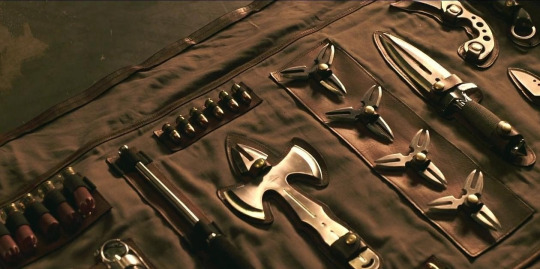
) and snarkily make a point to say that the evil that they'll be dealing with is much older and special-er than that Christian stuff ("[*our* made-up garbage is totes more ancient and valuable than *your* made-up garbage]"). So they defeat the spirits by yelling "this is a house of the living, not the dead" with increasing dramatics, and that does the trick. Still, Kevin Bacon has to run through a portal to retrieve his son, and he manages to tell the spirits that they should take him instead (why would that be a better deal for them? Trading places just ends up seeming like generic heroics. The spirits should just close the portal and take them both..). Then the movie ends with a few frames of him playing soccer with his autistic son, which is a call-back to a scene where Bacon listens to Paul Reiser telling him that after believing in spirits and stuff that his life went back to normal, including generic suburban activities like soccer with his son. So really "it's about family! It's always been about family!" or that kind of obligatory feel good ending type vomit.
Anyways, I think that all of that was supposed to show via a white bourgeois family that in the absence of the enforced power of the Christian religion life will spiral out of control into immorality and despair (they suffer from their daughter's bulimia, their son's autism, and their own infidelities and lack of communication). More importantly, this allows for other religions to be reawakened — the disenfranchised religion of these ancient Native Americans (Mesa Verdeans, I think), for instance. The "horror" would be that they have been de-centered (the family's religion is no longer in control; it is no longer all-important because its myths have begun to evaporate in the multicultural world). Still, this de-centering backfires in the writing because it privileges another ridiculous myth (that of the Mesa Verdeans) when the Gloria character (Ilza Rosario) indicates that the Mesa Verdeans were even more significant and that the bourgeois family is silly for thinking that their Christian god can do anything. The idea is that by being open to this alternate religion and learning its rules they can be at peace in the multicultural world, but the stupid part comes from Gloria's prizing of this religion. That line should have been cut or altered, maybe to show that they'd just be using one tool among many for one of many possible absurdities.
Overall
Very stupid movie. It seemed like the second half must have been heavily revised into something more pop-culture friendly. I suspect that it originally had a dark ending where the family suffers an ending not unlike that of the family in the Sinister movie, but probably they brought on another writer who gave it the "mass release" revisions that it needed in order to become irrelevant trash.
0 notes
Text
“The Last Witch Hunter” (2015) Movie Review
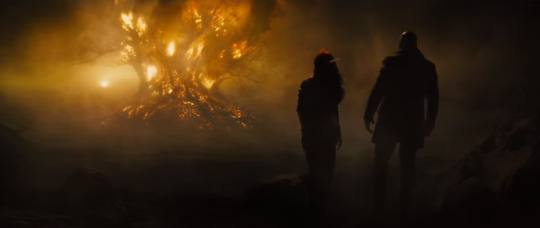
Was aktly a pretty kewl movie! Not quite -super- kewl (so not crucial), but it had a lot of creative witch sets (underground lairs, tree fortresses, imagined apocalyptic futures where the Earth reclaims the world, etc.), and it minimized religious aspects, even separating Vin Diesel's character from them (they seem to be moving towards a "beyond good and evil" thing). It ended up being like a combination of Constantine (2005)(immortalized hunter of evil), Black Death(2010)/Season of the Witch(2011)(Black Plague and witches), and Night Watch(2004)/Day Watch(2006)(with its mention of ancient peace pacts), but it still managed to do its own thing.
Rose Leslie's character was very kewl, but my main complaint (and why this movie wasn't -super- kewl) was that her romance with Vin Diesel seemed a little awkward.. like they didn't quite have chemistry for it to work. I was trying to decide if this was just because I personally still think that it's "Ygritte and Jon Snow 4evar," but I don't think I'm quite that petty ;p .. so I think it's more just that the director didn't really put the right effort into their relationship.
Vin Diesel's character was too much the "eternal player" type, and this wasn't really seen to change much with his attraction to Leslie's character (had he changed enough to see her?). On her side, I think it actually worked a little, just because she was directly exposed to his subconscious via some well-directed flashbacks (so there was room to guess that she might see something desirable).. but.. I don't think the director spent enough time working with Vin Diesel — to show what might be desirable. Yes he had lost his family, but his flaws were taken mostly for granted (how had Leslie really perceived them? How had Diesel processed them in relation to his immortality?), so Leslie's presence didn't seem to alter him in any significant way. The silver lining on this was that they never kissed or anything, and the writers/producers intend to do a sequel (or at least hoped to if this movie had performed well, which it didn't), which means that major relationship developments were saved for future story work (which probably won't happen).
Their relationship being the major issue for me, the lesser issues came from random corny moments.. especially the ending, which seemed too upbeat and almost a comical — even if unintentional — repeat of MiB's car pan-away (ignoring the "dice with the universe" thing):
http://youtu.be/AJOVUF-HaDw?t=8s
..though it was also similar to something else that I can't quite place..
Anyhow, personally I think they should have gone with a more foreboding ending (the evil awaiting), but with a PG-13 rating, it's not unexpected for them to go light with some actioney buddy cop routine.
Blerg.
So, I understand why this movie flopped (paid critics typically hate Sci-Fi/fantasy/adventure combos, and they definitely hate Vin Diesel), but I kind of liked it. I just wish they'd done a few things differently: an R-rating, either replace Leslie/Diesel's romance with a Platonic admiration or else do more background work on why Leslie's character might be attracted to a Diesel-type, a more dramatic/foreboding ending, and someone should have been fired for putting Harry Potter in a white turtle-neck sweater. Seriously? Bad, wardrobe! Bad! ;p
Because of these flaws, it just makes me want to watch Hansel & Gretel: Witch Hunters (2013) instead, which I really liked and I don't care if it "flopped" almost as terribly as Last Witch Hunter — critics don't know how to love clever horror/sci-fi unless it comes with pretentious attachments, whereas I think that characters interacting well can save almost any absurdity of script, because it's always possible to laugh while living in apocalyptic ruins :p
Overall
It flopped, sure, but it probably didn't deserve to flop this much (cost 70 million, has made only 25 so far). Even though peeps hate Vin Diesel (and it's def unfortunate that most associate him with Fast and the Furious instead of Chronicles), it had a lot of cool visuals, world-building, and characters (Rose Leslie ftw). I wish they'd done things differently, but no way does this deserve a 14% on rotten tomatoes while the Katy Perry movie gets a 77%. Fickle fucks! ;p
0 notes
Text
“Crimson Peak” (2015) Movie Review
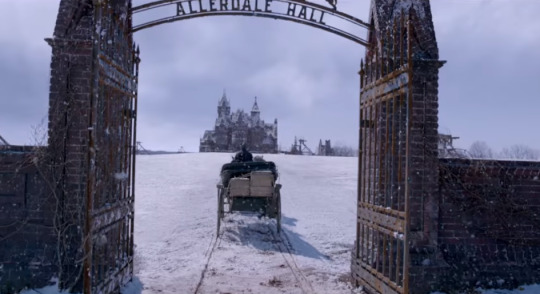
Was okay, but very very skippable..
The short version is that it has the same problems as Pan's Labyrinth (also directed by Guillermo del Toro): really great sets, color palettes, lighting, and overall imagery — but terrible writing.
If this movie had just been a camera wandering around a haunted house but with no characters, it might have actually been -better- than this (or at least had the same overall effect), but instead there's this really obvious plot with zero deviations from the most classical clichés. The entire story is basically, "incestuous siblings marry rich young women and kill them for money... also, look at these ghosts." By the second half I kept hoping, "okay... the main plot has become obvious, now where will it deviate from the expected? Will the house turn out to be an entity with its own desires, maybe having forced the siblings to murder in order to stay alive? Anything?" Nope! :p ..
I suppose that there's a device in that. Could del Toro (also the script writer) have produced the most unexceptional script so that his great set work and imagery could take center? Possibly! If so, can't -totally- blame him, because he really -is- great with set visuals. But, it's kind of a waste. Why handicap a potentially great film by only partially enacting it? Crimson Peak made -so- much effort in its visuals (and even limited its usage of CGI's unexceptional gloss) but tied it together with a script with no life in it. I have to think that that was -not- intentional. Instead, the story itself can be seen as del Toro's self-reflection on his own bad writing, which he failed to escape..
Writer Surrogacy
Mia Wasikowska's character (a beginning novelist named Edith Cushing) was likely del Toro's surrogate in the movie. She seems unable to captivate publishers with her ghost story (maybe like a young script-writer submitting to Hollywood), so she hopes to neutralize her writing by typing it (this so that her 'feminine' hand-writing can't be recognized and so that she can perhaps be judged by the words themselves). But, her first honest review comes from Tom Hiddleston's character, Thomas Sharpe, who demolishes her naïve romantic sensibilities and lack of grit. He explains that love is messy — not some "perfection" as she portrays it — and he basically says that she lacks life experience. Now, viewers -could- say that Sharpe was dutifully breaking up with her as commanded by her father (and thus meant none of it), but it would be unrealistic to think that he wasn't speaking from a place of truth. He might have embellished that truth if he hadn't had to break it off with her, but this was likely the -cold- truth according to him, as honesty can result when social conventions don't have to be observed, and a breakup tends to be a great time to be in non-observance of convention. Okay then; she (as a young del Toro) is a bad writer. Time for her to grow into a person whose life experiences permit depth, right?.. del Toro must hope so, anyways.
The story seems to be built on the idea that Lucille (Jessica Chastain) and Thomas have the gritty, true love that Thomas was describing, and on a written level viewers might agree: they have murdered their oppressors together, and they've suffered in a kind of exile with their ghosts ("ghosts" which the story was painfully explicit in saying are "metaphors" for the haunting past). Edith becomes tormented by these past-gazing siblings and by the past's "ghosts," and given del Toro's heavy sampling of past cinema (such as with his constant use of early horror cinema's iris wipe, with his direct homage to The Shining's bath tub scene, etc.), in cinematic language del Toro could be saying that his "life experience" came from his (as Edith's) being tormented [as a filmmaker] by horror cinema (his own cultural past) — tormented maybe by its pop culture status, by its weight in collective consciousness, by its demanding that future cinematographers bleed in order to contribute to its body of works. Edith's injured and bloodied state by the end would then play the part of showing del Toro's passage through cinematic history, his rising out of it and into the present, his attempt to take his knowledge of the past with him, his overcoming the burden of old cinema by making peace with it through homage and alteration/re-invigoration (past and present an irreconcilable unity, given Thomas' inability to escape with Edith, just as homage changes the original form). This could be the indication of the ending scene, where visually the "book" closes on the story of Crimson Peak — with Edith being its [”now capable”] author. Of course, cinema being its own language, the written word is not just the script's words, pre-screen; cinema's authorship occurs through the visual story, and in that domain (del Toro the author of the "visual book" of Crimson Peak) del Toro has fallen into a statement on himself which is not as heroic a becoming as he might believe.
A Soft Horror
Again, similar to Pan's Labyrinth, while the story was given the background of colorful sets, the sets and creatures have been given a gloss that doesn't quite lend itself to horror. Viewers might say, "but skeleton ghosts rise from the floor! They attack through doors!" but this would be missing the framing of these ghosts. The cinematographer is in love with them, not sharing in the -potential- horror of the viewer. For instance, when Edith sees a skeleton chasing her, the screen does not cut away from the initial instance of the rising in order to show Edith's reaction (as audience surrogate, her horror would be communicated as the audience's horror). Instead, the scene does not cut away. The full effect of the green skeleton's rising is shown with a lingering, stable camera, to the extent that it is not a terror (people look away from terror, they may even shake in terror, but to linger on it shows mental understanding, free from visceral responses). By the time the camera -does- cut away (a good 8 seconds later), Edith's facial expression seems almost out of place. Didn't she see what viewers (viewers aligned with del Toro, whose camerawork frames how this skeleton is to be perceived) saw? Didn't she see that this skeleton is a friend?
The entire movie suffers from this effect. The shots linger cinematically and affectionately, to where even when a character is stabbed, facial expressions and exposition communicate that "it's okay; there's no fear here; it's beautiful even." On the surface this is fine ("why insist on this movie making anyone afraid?") and it lends to del Toro's creating of an attractive setting, but related back to Edith's (del Toro's) "suffering for depth," the high gloss on these shots shows a person who has only cosmetically suffered. When even blood looks like it was painted carefully by studio hands (Wasikowska's attractive cut), when actors deliver "deep" lines with a tone of theater melodrama (Hiddleston's stairway scene), the effect is not a portrayal of true love as a love for even the horror, but a potrayal of a surface love which dresses up its "horror" with non-horrific artifice — like jewel-encrusted skeletons: death given the semblance of something attractive when removed from the visceral response.. a pretense of suffering never felt. Even Tim Burton, who dresses up his horror, does so with a dejected social sense; his characters know loneliness and feel broken or scarred, something which shows in his framing and the performances he gets from his actors. And Stanley Kubrick, who lingered for long moments on horror scenes, did so with a frame of malevolence — making the viewer see as the monster, and by that, fearing that the monster will look upon them. Del Toro has only looked upon the image of horror and lovingly reproduced that image, seemingly unable to access what inspired the image in others.
Overall
Yeah, this was a long way of saying that del Toro seems incapable of communicating deep pain (likely from a lack of having deeply reflected on any pain he's felt, or having not felt much anyways) and by effect, he seems unwilling to be truly sadistic with his characters, because sadism quietly requires a projection of one's own pain. This divorces his "horror" movies from the trauma that accompanies effective horror.
Even so, accepting this divorce (where del Toro works merely in the image, not in fear or the dissonance of a consciousness reconciling itself with a sinister world which birthed the daemonic image), Crimson Peak supplied a very colorful world with intricate sets. The movie itself may not be effectual, but its artistic elements can lend themselves to peripheral inspiration.. like viewing fragments which could be assembled into something greater.
0 notes
Text
“Black Mass” (2015) Movie Review
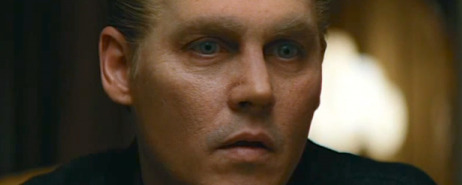
Wasn't especially interesting. It delivered on real crime violence (like Donnie Brasco, Casino, Goodfellas etc.), but it ended up falling very flat on character portrayals.
Empty Characters
The main character, Jimmy Bulger (played by Johnny Depp), was pretty much only described via circumstances and dialogue: "[he went to prison, they conducted LSD experiments on him, he's crazy, etc.]," but no particular motivations behind his character really grew from the story. Lots of his violent actions were shown, and it was pretty clear that he tends to be reactive to social slights, "witness for the prosecution" threats, and perceived disloyalty, but they never really established any kind of end state for him.. like.. did he want to "take Boston back from the Italian mob," like Agent Connolly (Joel Edgerton) claimed to want? Did he just want to get rich? Neither was really shown. There was even a scene where he decides to help the IRA by sending a weapons cache across the Atlantic, but why? For money? Because he suddenly felt loyalty to Irish cousins? Because he hated the British? Maybe it was simply a matter of having been to the Irish Independence parade and getting it in his head that he could help in a criminal way, but Bulger's mental processes were kept entirely unexplored. Even Agent Connolly's character washed out, because the most supplied for him was that in two different scenes he was shown wearing new suits, and it wasn't even clear if those suits were the result of money earned from promotions or money gained from bribes.. he was just "really loyal" I suppose :|
..As far as the movie was concerned, this gang basically just killed people and went drinking (and not even calamitous, "tip everyone all the monies" drinking). The movie never "followed the money," showing the criminal enterprise's successes and failures — just one celebratory visit to Florida. At times it seemed to want to focus on how embarrassing this must be for the FBI, but without showing the financial dimension, it wasn't really possible to tell if Bulger's gang really had become an unacceptable alternative to the Italian mafia that it had dethroned. Mentioned were drug trafficking at a high school, but otherwise the only people killed were low-level criminals, so the moral dimension of "innocents in the crossfire" was also left to the side. Even the murder of Deborah Hussey (played by Juno Temple) fell flat, because she was a one-dimensional prostitute character who may have told the police too much, all of two minutes before her death. I suppose viewers should be thankful that she was shown at a Christmas party earlier in the movie — she did, apparently, exist.
Basically...
Director Scott Cooper and his screenplay writers decided to put a bunch of criminal murders into a 2 hour movie, seemingly without any interest in the mental processes of any of the characters. Depp's character became another costumed type for his makeup collection, and everyone else just said their lines straight from witness testimony. There was very little attempt to do anything creative with the story facts. They just happened. That could be fine if it were intentional (it could convey some hopelessness or randomness to this criminal world), but this movie was pretty clearly a thoughtless endeavor. Its most impressive element came from the editing of the ending credits. Not exactly worth the viewing time.
0 notes
Text
“99 Homes” (2015) Movie Review

Was hilarious! :D .. I mean, it probably wasn't trying to be, but it was definitely hilarious.
Trailer
http://www.youtube.com/watch?v=sfttvNCIJvE
About
This is the Marvel/DC crossover where Spider-Man (Andrew Garfield) battles General Zod (Michael Shannon).. except not really. Basically Spider-Man loses his family house because he was late on payment for evars, and he ends up working for General Zod because Zod's real estate company has become one of the only paying jobs in the area (at least for a blue collar fix-it type).
Shaky Sentimentality
The movie was supposed to show how morally reprehensible it can be to work the real estate system against home renters/owners, but it couldn't help but show that the people who fell victim were tragically idiotic. For instance, Spider-Man's character really wanted -his- house at all costs... but why? The movie repeats this desire for family foundations like it should mean something, but what if it doesn't? What if people agree with Zod's character and see that a house really is just walls where your stuff goes? Is "stuff" home? Personally, that's how I feel about it: home tends to be wherever the majority of your possessions happen to be, and possessions can be so transient in location that attaching sentimentality to them becomes as equally without gravity as the walls that typically surround them.
Shannon's character seems to appreciate this nomadic lifestyle (material as utility, utility being transient), which can make his character an unintentional hero of ugly market circumstances. Audiences were meant to pity and identify with Spider-Man while abhorring Zod, but the audiences who would pity would be the ones who attach sentimentality to locations like "home" (the house, the walls, the "history"), while the people who might have the power to change the injustice wouldn't, because the argument in this movie was confined almost entirely to this misplaced nostalgia — which the nomadic wouldn't feel.
For me, the movie's only effectual moment became the forged document (naturally the climax of the movie), because -that- was clearly a manipulation of the law. There were other illegal activities in the movie (like stealing appliances and AC units), but the victims in those cases were the banks and competing real estate companies — hardly something over which to feel bad. But, the evictions of people who failed to keep up with payments? Those people were upset, surely, but must viewers pity them? Certainly the system failed those people by even allowing them to have homes that they couldn't pay for, or by putting predatory practices into place that were designed to prevent them from paying off their houses, but generally it's difficult (at least for me) to pity people who overextend their assets into material possessions. I can't pity a poor person with a smart phone (how many jobs require more than texts, calls, and e-mails? Do they need a 70+ USD data plan and a 600+ USD cell phone? Hardly. And it's a joke to me that people have been convinced otherwise). I also can't pity a poor person who wants to pay exorbitant payments on a house. What life is being wasted by anchoring oneself to fixed locations and expanding possessions? Would Spider-Man's character at his most successful (possessing his house and having a family with "food in their mouth") ever leave his pedestrian mediocrity, or would "home" be enough? His was a character who didn't even know how to want more than the programmed checklists of modern society — "home", "family", "stability".. ("well you did lose a lot of versatile solutions for modern living").
Anyways.
That's why this movie was funny for me — it essentially asked viewers to pity consumers/materialists. I should disclaimer and say that I don't respect the real estate people for making a living from parasitism, and I don't like that rental models in the U.S. don't pay into any lasting property (money vanishes into the apartment model, so home-owning via payments can be far more practical), but this movie's focus was almost entirely on the emotional ("dey tuk R houses n R jerbs!"), while neglecting the choices that doom people to ruin — their overextending into possessions instead of tracking their ability to make payments. So the housing market and the effects of its popped bubble bailout may be corrupt, but its victims, hardly blameless. Yet let us praise consumer society!
0 notes
Text
“The Butterfly Room” (2012) Review

Just *awful* :/
About
Trailer:
http://www.youtube.com/watch?v=w_bAbKXhJAk
Basically, a lepidopterist (butterfly collector), who has coped with the absence of her daughter by dealing with preservatives, murders one of her apartment building's maintenance workers at the threshold of her "Butterfly Room", sending the movie into a pattern of half flashback and half "present" time to explain.
Terrible Acting
The acting was immediately painful, and it continued this way throughout the movie — not a surprise for an L.A.-based movie featuring veteran B-Movie star Ray Wise and actresses such as Heather Langenkamp and Erica Leerhsen, who have been in many horror movies (classic ones, in Langenkamp's case) but never with significant performances. Ann, the main character, was played by Barbara Steele, another veteran horror actress, and while I don't suppose her acting was necessarily -bad-, she certainly wasn't able to prevent her lines from exposing the bad writing which undermined the entire attempt.
Terrible Musical Scoring
This movie was another example of a tacked on musical score that made common moments seem entirely ridiculous. For example: in one scene, the camera reveals the contents of Ann's trunk to the viewer, which includes a large, silver nail — ♫[stock shriek sound!]♫. "Oh no! A large silver nail! So scary!" The better musical selection would be maybe an ominous synth sound or something, because shriek sounds don't make sense in -foreshadowing- moments. Still, the movie repeated this formula a number of times — showing objects or typical scenarios and accompanying them with shriek sounds. But, simply because the shriek sound was the only sound they had, when those "shock" moments finally occurred, the movie got it right merely by having done blanket coverage.
If someone wanted to give undue credit to this musical selection, it could be guessed that it was meant to highlight the horror in the seemingly everyday, but that would be very kind. Watching this movie, you know that they didn't put a lot of thought into the production side, so the real result for the viewer is that the "shriek" moments become comically overused.
Mediocre Directorial Style
This was directed by Italian director Jonathan Zarantonello, who hasn't done much yet. He has almost no style, so most of the movie was just him trying to get things into frame. The musical choices could probably be explained by this middling ability, because a lack of camera skill could easily lead to a lot of poorly-applied fixes in post production. Still, it's possible that the language barrier prevented him from doing well in this particular movie (his first English film), so I'd expect his Italian language movies to be at a higher level.
(( Spoilers ahead ))
Slow Movement Speeds
The movement in this movie was also quite comical. In order to make Ann a villain, people basically had to be really slow or incompetent in her presence. At the height of this, there's a scene where Nick (Ray Wise) could easily attack her, but instead his foot breaks through the bottom of a wardrobe — which was apparently made out of balsa wood — so he finds himself immobilized.
Weak Plot Developments
The opening scene of the movie shows Ann being severe with her daughter, barging in on her while she appears to be having her first period while taking a bath. The scene ends abruptly, so the viewer must assume that the daughter has been drowned in the tub. Later, when Ann's daughter turns out to be alive, the rest of the scene is shown.. and it's pretty weak. This scene was meant to be the crowning moment of a childhood of terrible traumas for the daughter (who declares that she needed a lifetime of therapy afterwards), but it basically goes: "you're so dirty for having your period in the tub! Now I will attempt to drown you in the very water which you have bloodied! Oh no! Your father has stopped me!"
*Could* this actual event have been traumatic? Certainly, yes, even if only in an L.A. decadence kind of way. Was it directed with real trauma in mind? Hardly. Even if viewers weren't distracted by the badly-done soft focus which was designed to make Barbara Steele look younger, the performances and direction within this scene were not focused on the horror of being brutalized at such a delicate moment; viewers instead see legs in a bath, spreading blood, hear Ann's voice, hear the door open, hear a struggle, and then see a child's surprised face underwater. And the scene ends not on the child's face — perhaps building depth behind her abused character — but on Ann, whose face cannot be read beyond the soft focus. Largely ineffectual.
But if the bad acting, poor direction, poor musical scoring, and poor representation of trauma were all ignored, does this movie have any saving features?
Sort of...
Significance of the Butterfly Room
Notable was the threshold of the Butterfly Room itself, which Ann says cannot be crossed by men. This first occurred with Chris, who upon seeing the contents of the room becomes horrified and is then murdered by Ann. Later, Ann has a cupboard placed in front of the door (another symbolic portal), and the prepubescent Julie must punch a hole through the back to even glance at the room's contents. She later makes the hole larger and accesses the room, where she discovers Alice's body ("undressing" the glass which encloses Alice, so that she can examine Alice's body) and comes under threat from Ann. The above mentioned scene of Nick's trouble with the cupboard was also an implementation of the writer/director's will in this respect; Nick cannot enter the room, even if he wants to protect Julie. In other words, given that the room cannot be accessed by the living male, given that a prepubescent girl can only guess at its contents (working at the exterior), and given that entering the room spells mortal threat, the room likely represents a female-specific puberty (incomprehensible or inaccessible to men). This being akin to sexual discovery and awakening, for Ann it means irrevocable change that in her narcissism she wants to stop with preservative acts. This of course signals back to the scene of Dorothy's first period — an event met with similar violence by Ann and an incomplete saving by the father figure. And so the psychological divide between mother and daughter has been born in cinema symbols, and in Electra complex fashion, Dorothy can only be psychologically free by killing her mother, but of course, the pattern repeats again; the same competition begins with her own child. Fearing her own death, Dorothy attempts to project her want of immortality onto her son, who himself has begun changing, terrifying her into neurosis.
In this way, Ann's butterflies seems to be symbolic of her failed attempts to preserve her own youth in herself or her youth via her daughter. There exists a kind of Freudian narcissism at work (Freud in "The Uncanny"), where Ann feels most whole when she chemically-induces "immortality" in her butterflies. And in Nietzschean Egyptianism..
"They kill, they stuff, when they worship, these conceptual idolaters—they become a mortal danger to everything when they worship. Death, change, age, as well as procreation and growth, are for them objections—refutations even" (Twilight of the Idols)
.. this "immortality" has been contrived; this "preservation" requires destruction. This was seen firstly when the remains of Alice's mother were disturbed. Ann must revisit the body with chemicals in order to mummify it, but when an elevator tile falls on the body, chemical gas escapes and a dissolving inner body is revealed. A similar effect was shown when Ann removes the pin from Alice's body, which bleeds like an uncorked wine bottle. In either case, it is seen that the act of "preservation" — an attempt to prevent change — only affects appearance states, while the thing which was "preserved" has actually decayed or been destroyed. Ann's obsession then displays the insanity of this kind of acting — this thinking that immortal states exist or can be maintained. Ann cannot stop puberty or its changes, and every time she faces a world that has been changing despite her preservative efforts (like her old-style car in a hybrid world), she enforces her will (often violently) to satisfy her narcissism. Her murder of Alice's mother, Monika, finds explanation here, because while the "normal" Electra complex would have Alice and Monika at odds, Monika has embraced her own state of incompleteness (she is an amputee), fetishizing it even, and placing no barriers between Alice and her manipulations of the narcissistic bourgeoisie. To Ann this becomes reprehensible. Having not reconciled her own sexuality, she must destroy expressions of sexuality in others.
(( End Spoilers ))
Overall
I think that Jonathan Zarantonello was being intentional with these expressions of Freudian states, so he deserves credit for expressing them almost entirely through cinema (rather than relying heavily on script explication), but this movie was still bad. It reminds me of one of my favorite horror movies, Mister Frost (1990), which I like only for its underlying ideas and potential, but which I still call "terrible" for its poor overall direction and character work and its painful 80s/90s shoulder pad fashions and hairstyles. That to say: a good idea, but expressed with a painful B-movie gloss.
0 notes
Text
“No Escape” (2015) Movie Review

(trailer):http://www.youtube.com/watch?v=DOjj07EuO50
— not to be confused with 1994's "No Escape" with Ray Liotta!
It was pretty good, aktly. They did well in creating realistic setups and characters, like when Jack Dwyer's (Owen Wilson) family gets off the plane in their mock-Thailand (filmed in Thailand, but it's just supposed to be a nameless, Far East, tropical 3rd world country that is next to Vietnam but somehow is not Laos or Cambodia) they get to see all the taxi drivers yelling for business, a confident ex-pat (Pierce Brosnan) with sex-tourist attributes trying to give tips, and a Westernized local trying to appeal to them with a dated American cultural reference (Kenny Rogers). All of it should seem familiar for peeps who have traveled in that area, though this level of accuracy could easily be confused with xenophobia by dumb proles who possess only a cursory, uninformed activist's understanding of Orientalism or who otherwise missed the intention of the movie. Nevertheless, this realism helped when the "purging of Westerners" segment of the coup begins.
Realistic Staging
Showing that the reality before a mass killing can be oddly routine and that signs of the impending danger can be misinterpreted by those out of the coup's information networks, Dwyer's family is caught up in "normal" life and totally unprepared when the violence begins. I thought the shock and disbelief was communicated well, and their survival instincts always seem reactive, messy, and unplanned — probably the main selling point of the movie. Dwyer's relationship with his daughters played on this developing survival instinct, with one daughter in particular always resistant to the next survival decision, which was a good way to show that bourgeois sensibilities can result in death if people don't adapt to the new reality and instead stay mentally within the protections of a society that no longer exists to provide them. Sadly, this realism begins to crack towards the end...
(( SPOILERS ))
Broken Realism
The kind of brutal realism that was attempted in this movie can only be sustained for so long in a mainstream release, and that was shown in the later writing decisions. For instance, in a critical moment of the movie, Annie Dwyer (played by Lake Bell) attempted to make time for Jack Dwyer to grab a rifle, but when the rifle doesn't fire, the plan fails. It seems that Annie will be raped while Jack can only look on in horror, but -just- before the movie accomplishes total horror by committing itself to this outcome, Pierce Brosnan and "Kenny Rogers" show up to save the day. The unlikeliness of their arrival was never explained (were they following the Dwyers? How could they have been? The best explanation would be that they observed the scuffle from the brothel and acted quickly), so the movie immediately loses points for not getting ugly. "Ideally," Jack and Annie should have been brutalized, then either left for dead and limping along for the rest of the movie, or if Brosnan "must" show up, he'd arrive too late. A similar situation happens later..
When the Dwyers reach a boat that can take them to Vietnam, Jack again finds himself trapped and about to die. This time his daughter will be executed if she does not shoot her own father (and probably also if she -does-, really). But, once again, the situation was stopped by a rescue; Annie distracts the coup soldiers for long enough that Jack can kill them. Here, "ideally" Jack should have been killed by his daughter, then, either the daughter is killed and Annie escapes with the other daughter (the more likely outcome), or Annie manages to kill the men and rescues the daughter (less likely). Personally I think this movie should have ended with Annie and one daughter arriving in Vietnam, brutalized and subject to immigration laws while she waits for U.S. intervention.
Poor Critical Commentaries
I was a little surprised that this movie was panned, because even though it broke towards the end, it was still pretty realistic and visceral, so I couldn't help but read a couple reviews of this movie, like one by Lesley Coffin, or another by Walter Addiego, or this sensationalist, Sean Burns.
None seem to understand this movie's intention. In their minds, it was xenophobic "othering." For critics like these, it was a "[white person's horror story]," where the generic business traveler shows up in a country where 1st world amenities don't exist and brown bodies kill and die indiscriminately. Addiego in particular does not seem to be familiar with genocide logic, saying, "we’re also told that the rebels are just regular folks out to protect their families. Funny, they actually seem like vicious, sadistic and largely indiscriminate killers" — is there a difference, Addiego? Was the Rwandan genocide perpetrated only by soldiers? No. When cultural cleansings through murder occur, motivations like "protect your family" become brutal. Farmers pick up the machete, shopkeepers rape their own neighbors. The coup enlists -everyone- with mechanical absolutism, and anyone who does not participate — anyone who does not kill the designated "enemy" — dies likewise; people end up "protecting their families" by participating to survive. This movie portrayed such a genocide, and it did it with a political twist that seems to have been missed or minimized by the reviews I've seen.
Thematic Message
So where was the intention? A couple of the reviewers I saw noted the colonialism message, but they called it "tacked on" or incomplete. So here's my reading:
From the very beginning of the movie, a separation is shown between the benefactors of colonialism and those who suffer from it. A monarch is slain, and around him stand dirtied and scarred rebels. The Dwyers get off a clean plane, meet a dirty airport, and then shuttle to a pristine, Western-friendly hotel. It is only when Jack ventures outside the hotel's unrealistic façade that he meets the angry mob of the revolution. All of this was visually communicated, but if that wasn't enough, when the surviving Westerners have fled to the hotel roof, the mob chant of « sang pour l'eau » ("blood for water") is explained as being the result of Western interests owning the country's water supply — something which has actually happened — and thus the mob intends to reclaim their water with blood. This was established early, so that by the time Pierce Brosnan pauses for a moment to explain the situation in detail (the "tacked on" moment that was brushed off by some reviewers), it should already be obvious. That is, in neo-colonialism style, Western banks opportunistically create debt so that they can own a country's resources and means of production — something which creates instability and ressentiment within the exploited country. The result? When the puppet government falls, Westerners and Westerner allies meet a violent purge, and refugees flood the neighboring countries.
This background was clearly established within the movie (not "tacked on"), in effect showing Westerners a visceral account of how it feels to become such a refugee — to be in a country which is falling apart and to have "no escape" ("Oh! the title of the movie!"). This message should be especially resonant given the mass migrations into France and Germany due to the puppet governments of North Africa and the Middle East collapsing. Like some of these refugees, the Dwyers even have to cross to safety by boat, and by this point in the movie, being shot to death by Vietnamese soldiers (symbolic of functionaries of Western interest, like boats intercepted in the Mediterranean) seems -better- than staying in the war-torn country, where no hope exists.
Could this have been played out more effectively by the film? Definitely. To make this point real, they should have removed Brosnan's presence in the later sections of the movie, and variations of the "ideally" situations above should have taken place ...But then this movie would have been another "Hotel Rwanda" — a genocide movie that was critically praised but publicly ignored. Hollywood, in its instructive effort, made obvious concessions with this movie (addition of an action hero plot, "savior" moments, random comedy, etc.), but its message still survived in form, even if the critics have missed it.
(( End Spoilers ))
Overall
This review got long because I made the mistake of reading other reviews, but back on point: this was a visceral survival movie framed with refugee/genocide logic — and can be worth seeing for those elements — but ultimately it misses the mark with its unwillingness to maintain realism with its writing. Things should have gone far worse.
0 notes
Text
“The Gallows” (2015) Movie Review
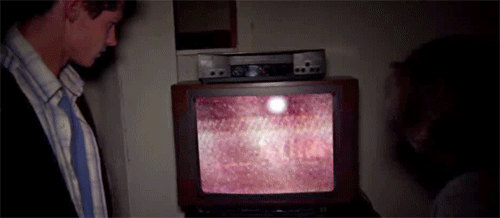
Unwatchable garbage.
About
This was the one where some kids break into their own high school to destroy the set of a play ("The Gallows") only to find out that the school is still haunted by some spirit of the 1993 production. Once they find themselves locked in, they run around campus under the guidance of poor writing.
Rating Failure by MPAA
While I would normally outright avoid a movie like this (the trailer made it look poorly done), its R-rating made it seem like it could hold some hidden potential; R-rated horror typically doesn't care about audience catering and instead wants to do its own thing, whereas PG-13 horror was designed for marketability. But I have no idea why The Gallows was rated R. I've read the MPAA description ("Rated R for some disturbing violent content and terror"), but that description would typically be something for PG-13 movies — which The Gallows effectively -was-.
This movie had -no- ultraviolence, I don't remember any real swearing (nothing like "fuck" or "fuck my rotten corpse while it hangs from the gallows"), the "terror" was very mild (just a couple of predictable "jump scare" scenes and some pursuits), there may not have been so much as a scrape on screen (no blood), no nudity (partial or otherwise), and certainly nothing that would psychologically scar a 16-year-old. Its most "R" moment would probably be when they showed a dead teen hanging from a rope for all of about 3 frames, but that was just some light make-up effects — again, PG-13 level. Did they rate it R because a student was apparently hanged in the first few minutes? That wouldn't make sense — grainy footage with no gore effects, why would that be R?
This movie was a very soft PG-13 which was severely mislabeled R. Its "violent content and terror" were mild and self-censoring — it was clearly made for a PG-13 audience. So why did the MPAA screw the filmmakers on this? Total incompetence, or maybe it was some kind of studio infighting? Did the MPAA decide to economically screw the producers (vengeance for not being bribed?), or did the producers ask for an R-rating to hide this movie from the negative critique it would have received from a wider, PG-13 audience? Something went terribly wrong here.
(( Plot Spoilers Ahead ))
Intentionally Terrible Acting?
From the beginning the acting was a total mess, with Reese Mishler specializing in staring into space to feign a crush and Pfeifer Brown playing a melodramatic drama student. Still, this could be intentional, because after going through the trauma of a ghost chase, Reese's character arrives on stage to re-deliver his earlier lines with some stage presence... though it certainly helps his apparent character growth that the camera was 50+ feet away during this ending scene (theater actors don't have to worry much for microexpressions). Sadly, this "growth" was itself melodramatic, showing a kind of painful story writing.
Inconsequential Writing
The story itself seemed to have attempted some kind of anti-bullying narrative, but it was mostly lame. A jock archetype peppers the early narrative with inarticulate hate for his foosball friend's love of drama class, and this archetype continuously torments the pear-shaped stage manager (given that convincing proles to kill themselves should be an art, the jock's major failure seems to be that his style of bullying lacks subtly). It could be that the writers were allowing bullied viewers to welcome his death, but this kind of screen justice was blurred by the story's failure to give the malevolent entity a coherent motive. Was the entity bullied? Maybe.
In the 1993 production of the play, Reese's father apparently wasn't available to play his character (the protagonist, who falls in love with a noble and hangs for some legal version of crossing class boundaries), so the duty fell to a boy named Charlie. When it comes time for Charlie's hanging scene, something goes wrong and Charlie actually hangs, dying on stage. It seems that Charlie was originally supposed to play the hangman, so his haunting could be like getting to play the character he meant to play, but that's a thin motive — hardly worth haunting a school over. Charlie does target Reese in particular, and if this means a "sins of the father" narrative, then it's possible that Charlie blames Reese's father for not hanging in his rightful place and intends to take it out on Reese. That's also thin, because the story gives little indication that Reese's father caused Charlie's death simply by not being there (a superstitious motive at best).
So the movie leaves some big questions [unanswered?], like: why did Reese's father drop from the play? Did someone (Reese's father?) sabotage the set so that Charlie would die? Given the bully narrative, the simple conclusion would be that Reese's jock father bullied Charlie, Charlie was in love with Alexis (this given that Alexis gave birth to Pfeifer, Charlie's daughter), Reese's father had a crush on Alexis (just like Reese later had a crush on Pfeifer) but became jealous when he discovered Alexis and Charlie's relationship, so he dropped from the play and arranged Charlie's "accident." In that case, Charlie was meant to begin his revenge with Reese, working his way to Reese's father, killing anyone who seems similar to Reese's father along the way (any "popular" or "bully" types).
(( End Spoilers ))
This movie was likely designed to be a franchise cash grab, leaving these above questions to be answered in a sequel. But, given how terribly it has been reviewed, it's difficult to say if the producers will make a second. On the monetary side, they absolutely will, because — bad reviews or not — this movie became seed money; it cost 100k USD to make and made 11+ million in theaters, "so why the fuck not? Get a better director, give it a slightly larger budget, and let's crap out this piece of crap"
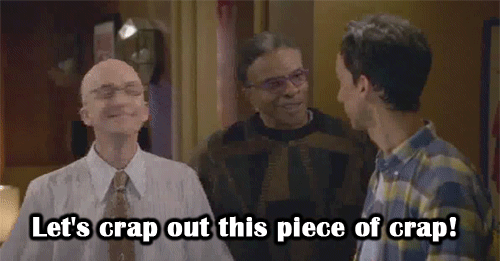
(producers typically react to money, not to quality, so they follow money scents like dogs trained to find dirty diapers). Then again, if the producers decide not to make another Paranormal-style festival of time travel and mindlessly interconnected story arcs, then these plot details really don't matter. This first movie was so poorly directed that not many people will bother with a sequel anyways — just masochists like myself — so the story may stay in this singular and shitty form. Wouldn't that be a nice dream? Where the producers decided not to just save entire sections of story for sequels, instead trying to tell a full story?
Overall
Yep. Just another story fragment that some producer pushed through to release and hoped would do well enough that another atrocious franchise could pollute theaters for several years. Seed money. Not a movie. Does that mean that the MPAA was really trying to save the world? Doubtful. They probably just didn't like the seed money percentage (bribe) that they were promised for a PG-13, so they bumped it to R so that no one would win.
0 notes
Text
“Terminator Genisys” (2015) Movie Review
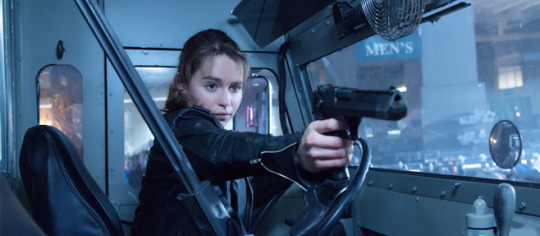
Was good!
Part of it being good was accepting that it still had some of the non-serious moments that made Terminator 3 terrible (like fourth wall-breaking jokes and things), but in this one they at least excused those jokes by having made Schwarzenegger's character an adapted/adaptable T-version. That left things not quite on level with T1, T2, or even Salvation (which I mostly liked), but it was a writing improvement over T3.
Genisys Software
In this one, Skynet's villain status transforms slightly into a connectivity issue. With proles insisting on expanding application connectivity, staring at glowing rectangles, and over-sharing personal information, it seems natural that self-directed life simplification invites disaster. Against a background of such doomed commoners, the movie's heroes emerge from an "off the grid" past and future, and the villain emerges from ultimate transhumanism (in the techno-modification sense; technology incorporation). This side of the plot should be familiar from many other stories, so I'll just add that Genisys almost started sounding like Windows 10 or the next iOS release, with people pre-registering to download, placated and unsuspicious of Trojan horses. I wonder if Windows or Apple will have to blame this movie for lower download rates? ;)
Frozen-Style Feminism
Emilia Clarke also proved herself to be a good Sarah Connor replacement, though Linda Hamilton set high bars. Clarke's Connor's romance with Kyle Reese (this time played by Jai Courtney; military villain from Insurgent and also John McClane's CIA son in A Good Day to Die Hard) seemed much like that of Frozen, weirdly, which would be to say that it dealt with proletariat-feminist questions of “how love can be possible without classical roles of saviour knights and damsels in distress” (ultra-politicizing minds typically make purely political decisions with love, failing themselves and their own passions in favour of abstractions. So for the prole/intro-feminist, who replaces one script with another, this type of Frozen formulation shows how terms can be set for people who still possess relationship libidos). There even exists an even weirder reading in this context, where Schwarzenegger's character represents Connor's vibrator, which gives Connor sexual independence, yet she may still decide to forgo her vibrator for an actual human — though of course her vibrator remains nearby, just in case. Hopefully this reading seems absurd, because just like reading phalluses into any mildly-cylindrical structure can become ridiculous quickly, so too can reading vibrators into any 'fear of machines' story.
Still, this -was- pop culture feminism. Most of the passion could be seen on Reese's side, with Connor's attraction then [possibly] seeming a simple product of flattery. The word "beautiful" was mentioned, and if it was taken in a vacuum, then that would be a shallow love. But, Reese further explains that his sense of this beauty comes from Connor's survivalist and maybe even feminist nature. From that sense, if Connor's attraction to Reese were not short-sightedly called some irredeemable suspension of judgment, then it can instead be like her realizing that she can kick down doors and blow things up and still be someone's ideal — that love doesn't require changing ('softening') that nature, and it doesn't even require a loss of self to pregnancy (her role does not have to be to simply make a future warrior; she can lead the resistance).
Overall
Having gone with expectations of T3 cringe, I'm happy to say that it was not that bad. It was actually kind of fun. Unless they try another closed, Salvation-type story, this franchise will likely continue to sacrifice its potential with PG-13 ratings and pop culture appeals, but despite its calculated, non-offensive script, Genisys brought good writing and a fluid story. Nothing incredible, mind you, but certainly better than watching Jurassic World and trying to like Chris Pratt's dinosaur romance — with such a low bar, why not do meth?
0 notes
Text
“Jurassic World” (2015) Movie Review
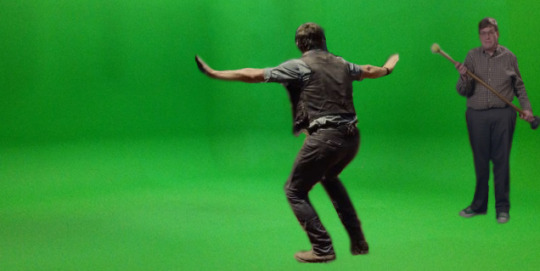
Was pretty much how you might expect if you know this routine: a pop movie that didn't try to do anything too exceptional — except for effects, of course. They didn't make any big choices, so nothing memorable happening. Still could be worth a theater watch for simple mass appeal (like those Marvel movies), though it's probably only worth the matinee price (and non-3D).
(minor spoilers ahead)
Minor Redemptions
I did at least like that they expanded on Dr. Wu's role for this movie. In the book — at least before he was disemboweled — they have Wu talking about his desire to make -accurate- dinosaurs or even just safer, slower dinosaurs, with Hammond instead demanding the next level of attraction. So the franchise again speculated on the cost of that kind of engineering while also adding Wu's cynicism into the mix. This addition meant that it wasn't just "oh no! genetic engineering raises ethical questions!" No, the movie sampled more from one of The Lost World's themes: “[will humans, despite having the complexity to prevent catastrophic extinction, destroy itself through its behavior]”? On this front, the movie went a little meta, showing not just that genetically engineering dinosaurs can be suicidal for humans — that is, it's never just about a creature; Grendel was never a beast. Here it's instead how an audience's desire for bigger spectacles can be self-destructive. Under that lens, Wu can almost be seen disgusted with himself for feeding into a system with such mediocre motivations (like a big-movie producer/director). Then of course the audience was implicated repeatedly with characters looking directly at the screen, showing that the theater audience can possess the same psychological problem — seeking out the next big effects movie with some stupid desire for bigger scale. But, unfortunately, this was a subtle directorial effect. To take it to the next level, the writers would have needed to kill the children, breaking the novelty of effects and disappointing viewers with seemingly real tragedy, but they didn't.
There were at least some small attempts at being interesting. In one scene the older brother speculates to the younger brother that the hybrid dinosaur could be close by, but when the younger shows fear, the older quickly lies to him to comfort him. For the full hilarity of this, the older would have needed to say, "see how my lying made you feel better?" but this sort of line (reflecting on lying as placation within the moment) was reserved for Bryce Dallas Howard's character in a later scene, which took out some of the impact, because it fell on her character like another quirk rather than a reality (the reality that things may not be okay). Then there was a funny scene where no sooner had a random Ingen troop identified himself as having served in Afghanistan — letting american audiences predictably start thinking "support our troops" or other patriotic refrains — than he was impaled by a pterosaur of some sort... The moments when the children cried were also sometimes funny, and Dr. Wu does escape with genetic material, so there seem to be specific plans for a sequel, which leaves the door open on some writer/director commentary, but it seems unlikely that anything notable will ever occur in this franchise.
Written for Non-Identities
Otherwise, this movie was mostly a pop-culture collage. Beyond Chris Pratt they brought in Ty Simpkins from Iron Man 3 (the little boy that occupied Tony's time), Bryce Dallas Howard (who stepped in for Rachelle Lefevre in Twilight, strategically making Victoria's death a moment of inconsequential theater), etc.. — all safe actors with provable and mostly tame records. These make great surrogates for the masses, who can identify with equally bland lives. They even brought in New Girl's Jake Johnson, who seemed to be there almost entirely for the man children who have "grown" from 1993's theater spectators into 2015's un-evolved consumer mouths. All of these characters test very well with focus groups, no doubt, and so they were selected. None could possibly offend, and so they fill the talk show couches with unscented asses. Would a eunuch ever shit? Certainly not while masters watch.
Overall
Pratt's shirt stays on, and the writing was too tame. They didn't even subtitle the dinosaurs. So if you expect a common, unexceptional blockbuster, then this was it; it delivered.
"Hype and mediocrity"
1 note
·
View note
Text
"Backcountry” (2015) Movie Review

Bad movie. Especially poor direction by Adam MacDonald, though the movie found slight redemption from a single scene of gore violence.
About
In this one, a couple go to some country realm that is sort of on the outside or "back" of normal country (sadly, no portmanteau exists to describe such a thing, though in German it's "schadenfreude"). There they find themselves lost and without modern conveniences to save themselves from a man-eating black bear.
"Based on a True Story"
Not based on a true story, "but it's certainly true that it is a story". Movies really have to stop reproducing this cliché for theatrical effect.
Production and Character Work
Although this movie reads like a bad horror, it was at least well-produced despite a seemingly limited budget. They were able to rent canoes, rent a trained black bear, [purchase?] a tent and hiking gear, and [rent? buy?] a roaring black bear model for the attack scenes. And, although it suffered terribly in its later moments, it at least -began- with some attempts at coherence and character building. The acting, for instance, was not bad at all ("bad" being the usual expectation for semi-indy horror), which -does- give credit to its actor-director (actors can make very good directors when it comes to character work). Both leading roles were given to established actors, and they were also able to hire Eric Balfour of the 2003 Texas Chainsaw Massacre for a supporting role, so the character side was not where the flaws were..
Terrible Scene Direction
When it comes to spatial awareness, director Adam MacDonald might be -almost- as bad as Christopher Denham (director of Preservation), but, more annoying even than Denham's contrived small space surprises was MacDonald's overindulgence in blur effects.
While there certainly exists a sentiment that "[not showing everything can increase suspense or terror]," here that rule was bent into the territory of, "this may as well be an audiobook because I can't fucking see anything." MacDonald could also get some support if people cite that he was using blur effects to simulate confusion, fatigue, and shock, but even that wears thin into the territory of, "this movie is unwatchable." If his intent was to make an unwatchable movie, then sure, I think that he succeeded. Still, it would be a poor excuse to say that this movie's being "unwatchable" because of blur effects could be "good" because "life is sort of 'unwatchable' when we're dying in the woods." No. Sorry. It doesn't work like that. It remains possible to distinguish between good blur effects and overused and poorly managed blur effects, of which this film fell to the latter.
(( Spoiler Ahead ))
Another Major Issue: The Attack Scene
Okay, so a couple ("Jenn and Brad") has become lost in the woods, they have bear mace, a road flare, an axe, some camping gear. Okay. The catalogue has been established. So how was it employed? With total stupidity.
I should say that I am aware that imperfect characters produce drama and that that's how the world sometimes works; mistakes can create conflict. Even so, management of mistakes can still be ridiculous. For instance, it was understandable that Brad would not bring a map or GPS because he was trying to cultivate an experienced and prepared image of himself for Jenn; Brad was showing Jenn his familiarity with the area and trying to convey to her his own sense of nostalgia for these woods, which would symbolically extend to his marriage proposal and the beginning of their own shared nostalgias. Thus, while Brad can be faulted for not taking the precaution of a map, that mistake shouldn't be painful; it should be tragic. But how do things go when the bear attacks?
- Brad unzips the tent and sees the bear near the camp fire
- Brad re-zips the tent and shows how scared he is
- Brad unzips the tent again and sees the approaching bear
- Brad re-zips the tent and cowers with Jenn
Stopping there for a moment, this is already ridiculous. If someone sees a bear walking around outside their tent, they wouldn't just hide under the blanket and play peekaboo — that is a terrible horror trope. Still, moving on..
- Brad and Jenn quickly go through the gear and find the bear mace. Kewls. Brad doesn't have his axe, but they at least have a strategy.
- The bear reaches the tent. It manages to paw through, and somehow the bear mace fucking disappears so the bear claws Jenn's arm. Then they find the mace, and -then- spray it.
Here, someone could stupidly say, "sure, they panicked," but a far more realistic strategy even for the most panicked camper would be to have sprayed the bear while it approached, from a partly unzipped section of the tent. Second to that, they could crouch in fear away from where the bear was scratching the tent — like they were — but be ready to spray right when/if it enters. Instead, the movie makers decided to add in this separate stupidity of the mace disappearing momentarily. And why? Why bother? This scene could easily have been just fine if they had behaved logically despite the fear, spraying from afar or spraying right when the bear opened the tent. That would have even added to the horror, because then would-be campers in the real world would feel uncertain about their mace saving them. So, either this scene was fucked because MacDonald thought that the bear needed there to be blood to coax it into fighting through the mace (which was unnecessary because Brad was already bleeding from his prior toe injury so that bear motive was already in place) or because he thought that it was necessary to conjure even more confusion and mistakes. Given the poor use of blur effects, I suspect that MacDonald thought that this was a good way to create confusion. He failed, instead causing this scene to self destruct the entire movie — all that foreshadowing, only for some contrived character action. Even Jenn's being in shock and just watching while Brad was torn to pieces was somewhat believable, even if annoying.
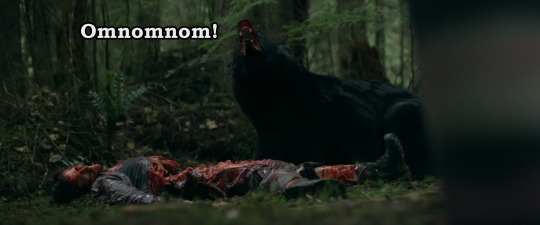
Whatever.
(( End Spoiler ))
Other Things
After the climactic moment, Jenn has a scene where she looks at the camera in a common "implication of the viewer" moment,
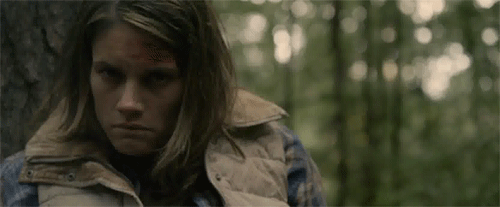
but to this point the viewer has witnessed so much stupidity that only clipped-winged proles would see that gaze and think, "wow, yeah, it could happen to anyone. We all have such fragile mortality, and without society to protect us, someone or something else gains control." Yeah, maybe. Mistakes can add up sometimes. But would you really drop the fucking bear mace?
Overall
An adequate film. Mostly forgettable. If MacDonald can learn to communicate shock with more control of blur effects and if he can write realism and still show how control falls apart, then he can probably do better in the genre. If not, then he won't. Still, RottenTomatoes somehow gave this shit an 88%, so “clearly” it only matters if you get paid to critique.
1 note
·
View note
Text
“’71″ (2014) Movie Review
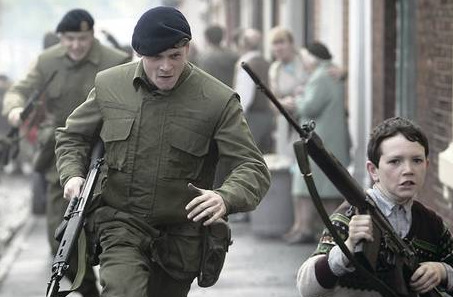
Was pretty good. Kind of tense.
About
This was the one where a British soldier finds himself stranded alone in a Catholic neighborhood of Belfast during the Catholic/Protestant "Troubles" of 1971.
Trailer:
http://www.youtube.com/watch?v=J-BaKfl1Ms4
Proles
I liked it, but this one generated a lot of stupid comments from the audience at my local theater — *during* the movie. It was apparently difficult for people to understand the Irish and English dialects, so peeps kept asking each other to "translate." People also didn't seem to understand the non-linear plot, the meaning behind the character duplicities, or the "unresolved" ending. That's somewhat understandable, since stupid audiences typically need closure.
Background
So, it might help for people going in to understand that this movie was demonstrating the arbitrariness of civil violence. This movie was not just about one soldier's adventure of survival; that soldier was a catalyst used to show how impossible/difficult it can be for a totally individualistic mindset to manifest its designs through violence. With webs of distrust, misinterpretation of the motives behind events, and snap decisions, characters found themselves victims of their own expectations and limited perspectives. Even within factions, ideologies split from moment to moment, with passionate and volatile confidence becoming a symptom of those most manipulated. There can be no confined ending to something like that, because it has no fixed resolution. Former leaders replace the old, understanding becomes buried behind pockets of Inner/Outer party politics, and the latest victims spread the fire, turning their families into freedom fighters — reacting to traumas whose perpetrators died with the act. "So it goes"
Anyways,
Postmodern pedantry aside, '71 makes for a good look at the confusions of violence. While I would not agree with the movie poster and say "extraordinary" or "a winner", it was still worth a watch.
2 notes
·
View notes
Text
"Blackhat" (2015) Movie Review
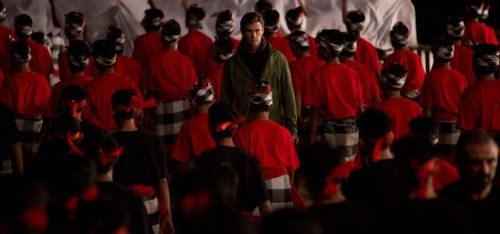
Was nice. It was by director Michael Mann so it had a lot of his Heat (1995) or Miami Vice (2006) style — scenes of gun violence and their traumatic emotional effects, where the after scenes were stylized by synths instead of the actual actor audio... kind of simulating the temporary echo effects or the shock experienced after fire fights.
Casting Error
Overall worth seeing for a realistic action, but I think that casting broke some of that internal realism by having Chris Hemsworth in the leading role. His character was supposed to be MIT/hacker smart, but it's Chris Hemsworth, who is maybe a little too physically perfect and rugged for that kind of role. They tried to balance that by explaining his prison history, but every time he hit the return key too hard it became a sort of reminder of how out of place he was in this script. I think this role was written with someone else in mind, but maybe production felt it would be less of a risk to cast Hemsworth..
Still, the writing was thoughtful if you remove Hemsworth's physicality. Like, after building Hemsworth's character's prison background, when it came time to fight he ended up selecting prison-style items (sharpened objects, magazines taped into a protective vest, etc.), and his fighting methods were stated and shown to be effective for close quarters. Again — thinking of the writing and not Hemsworth — that shows a hacker who had had to become violent and resourceful in prison to survive.. but at the same time.. would he really have had to shank anyone in prison? They also showed that he had made friends in his cell block because he was able to hack money into their commissary accounts, so it seems like he'd previously have been protected from that level of prison involvement and not be personally confident in physical attacks.
So one of the movie's written attempts at being clever also became one of its major weaknesses. They clearly wanted Hemsworth to be useful in all situations, so he was involved in almost every scene — scenes which should have taken 8 different actors were instead monopolized by one big star. He'd hack into one place but then physically go to another. At maybe the most absurd moment, he personally goes into a radioactive contamination area to remove a hard drive. Why would a prized hacker be allowed radiation exposure for a task that anyone could be given?
Overall
While this movie was a good showcase of Michael Mann's scene depth and realism, it seems that casting Chris Hemsworth was a move which single-handedly dismantled its script to make room for Hemsworth's action-hero status. I'm not saying that Hemsworth makes a terrible or irredeemable actor or anything, but it looks like this movie was written around him, and it suffered for that.
0 notes